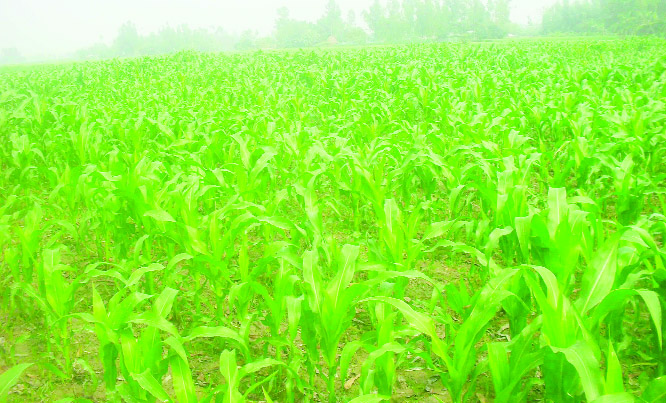
Field level agricultural extension and research officials and staffs have a vital role to inspiring and motivating
the farmers towards large-scale promotion of less-irrigation consuming crops in the Barind area.
Less-water consuming crops like wheat, lentil and chickpea have been identified as effective means of managing water-stressed condition in the drought-prone Barind area comprising eight upazilas in Rajshahi,Chapainawabgonj and Naogaon districts.
So, all the field level workers and staffs concerned should come forward and work together to attain the cherished goal of boosting crop production through managing the drought situation.
Agricultural scientists and researchers came up with the observation while conducting a daylong training sessions on the issues at Godagari Upazila headquarters in the district on Tuesday. More than 30 field level staffs including Sub Assistant Agriculture Officers and scientific assistants joined the training.
Regional Wheat Research Station (RWRS) organized the training in association with Department of Agriculture Extension (DAE) and Barind Multipurpose Development Authority (BMDA).
BMDA Chairman Dr Akram Hossain Chowdhury and DAE Deputy Director Shamsul Alam addressed the training as chief and special guests with RWRS Principal Scientific Officer Dr Ilias Hossain in the chair.
Dr Akram Chowdhury emphasized for the promotion of less-irrigation consuming cereal crops instead of depending on only Irri-Boro farming in Barind area.
He mentioned enormous scopes of increasing the acreage of low-water consuming crops like wheat, lentil, maize and mug-dal in the region.
Dr Ilias Hossaain said time has come to wide-ranging and sustainable expansion and promotion of conservation agriculture (CA) based technologies in the drought-prone area.
He clarified that principles of conservation agriculture are use of reduced tillage, retention of some amounts of residues on the field, optimum use of natural resources, sustainable and profitable crop diversification and its rotation and judicious use of fertilizers and pesticides.
Proper uses of technology to boost crop production emphasised
Scientists and researchers stressed proper uses of modern technology to boost crop production, urging farmers to cultivate less-water consuming crops for mitigating pressure on ground water in Barind area, taking its existing drought situation into consideration.
They came up with the stress at a daylong farmers training workshop titled “Technology Validation for Drought Management to Sustainable Crop Production in Drought-prone Barind area” here on Saturday.
Regional Wheat Research Station (RWRS) organized the training in association with Department of Agriculture Extension (DAE) and Upazila office of Barind Multipurpose Development Authority (BMDA) at Shapahar Upazila Farmers Training Center.
BMDA Chairman Dr Akram Hossain Chowdhury and DAE Deputy Director Masudur Rahman addressed the workshop as chief and special guests respectively with RWRS Principal Scientific Officer Dr Ilias Hossain in the chair.
BMDA Executive Engineer Abdul Maleque Chowdhury, Upazila Agriculture Officer Md Muniruzzaman and BMDA Assistant Engineer Rejaul Karim also spoke.
Dr Chowdhury said emphasis should be given to promote the less-irrigation consuming cereal crops instead of depending on only Irri-Boro farming in Barind area to lessen the gradually mounting pressure on underground water.
He referred to various research findings and said that there are enormous scopes of increasing the production of various low-water consuming crops like wheat, lentil, maize and mugdal in the high Barind tract.

